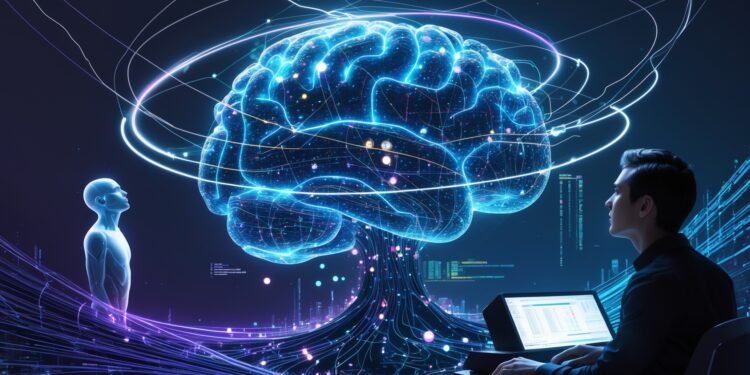Artificial intelligence (AI) is evolving at an unprecedented pace, and among the most promising advancements is the emergence of agentic AI—AI systems that can operate autonomously, make decisions, and execute complex tasks with minimal human intervention. Developers around the world are increasingly embracing agentic AI, seeing it as a game-changer that will revolutionize software development, enhance productivity, and unlock new technological possibilities.
As agentic AI continues to mature, it is set to transform industries, redefine how software applications are built, and empower developers with smarter, self-improving tools. This article explores the concept of agentic AI, its impact on developers, and the opportunities it presents for the future of software engineering.
What is Agentic AI?
Agentic AI refers to AI-driven systems capable of taking independent actions, learning from their environment, and autonomously completing complex workflows. Unlike traditional AI, which requires constant human input, agentic AI operates based on goals, reasoning, and adaptability.
Key Features of Agentic AI:
- Autonomy: Executes tasks with minimal or no human intervention.
- Decision-Making: Uses reasoning and contextual awareness to make intelligent choices.
- Continuous Learning: Improves its own performance over time.
- Multi-Step Task Execution: Can break down large tasks into sub-tasks and complete them systematically.
Examples of agentic AI include AI-powered software development assistants, self-learning AI models, and AI-driven automation tools capable of handling everything from code generation to infrastructure management.
How Agentic AI is Empowering Developers
1. Automating Repetitive Coding Tasks
Developers often spend significant time on repetitive and mundane coding tasks, such as debugging, code refactoring, and writing boilerplate code. Agentic AI tools like GitHub Copilot, CodeWhisperer, and Tabnine can generate optimized code snippets, suggest improvements, and even complete entire functions based on context.
By leveraging agentic AI, developers can focus on higher-level problem-solving instead of being bogged down by repetitive coding work.
2. AI-Powered Debugging and Error Resolution
Traditional debugging can be a time-consuming process, requiring manual investigation of error logs and code analysis. Agentic AI can automatically detect bugs, suggest fixes, and even apply corrections in real-time.
For example, AI-driven debugging tools can analyze thousands of lines of code, pinpoint anomalies, and recommend solutions instantly, reducing debugging time from hours to minutes.
3. Autonomous Software Testing
Testing is a critical part of software development, but it is often tedious and resource-intensive. Agentic AI can autonomously generate test cases, execute test scripts, analyze results, and identify potential issues before deployment.
This means developers can achieve higher test coverage and reduce software defects without spending countless hours manually testing applications.
4. Infrastructure and DevOps Automation
DevOps engineers and cloud architects are also benefiting from agentic AI, which is capable of automating deployments, monitoring system performance, and scaling infrastructure based on real-time demand.
For instance, AI-powered DevOps tools can:
- Automatically optimize cloud resource allocation.
- Detect and fix server issues before they escalate.
- Implement security patches autonomously.
This reduces downtime, enhances efficiency, and allows developers to focus on building innovative features instead of managing infrastructure.
Opportunities in the Future of Software Development
The rise of agentic AI presents exciting opportunities for the future of software development:
1. AI-Assisted Software Engineering
In the near future, developers could work alongside AI co-developers that understand project requirements, generate code, debug errors, and suggest optimizations—essentially acting as intelligent programming partners.
2. Faster Product Development Cycles
With agentic AI handling routine coding, testing, and deployment, software development cycles could become significantly shorter, allowing companies to bring products to market faster.
3. Democratization of Software Development
Agentic AI could lower the barrier to entry for non-technical users, enabling individuals with minimal coding knowledge to build and deploy applications using AI-driven low-code and no-code platforms.
4. New AI-Driven Innovations
As agentic AI continues to evolve, it could lead to the development of entirely new programming paradigms, self-optimizing applications, and AI-generated software architectures that adapt dynamically to user needs.
Challenges and Ethical Considerations
While the future of agentic AI in software development is bright, it also comes with challenges and ethical considerations:
1. Job Displacement Concerns
With AI taking over many coding tasks, some fear that developers may lose relevance. However, the reality is that AI is more likely to act as an enhancer rather than a replacement, allowing developers to focus on creativity, problem-solving, and innovation rather than repetitive work.
2. Security Risks and AI Vulnerabilities
AI-generated code may introduce security vulnerabilities if not properly monitored. Developers will need to ensure that AI-generated code is audited, secured, and compliant with best practices.
3. Ethical AI Implementation
Ensuring fair, unbiased, and transparent AI decision-making is crucial. Developers must implement safeguards to prevent AI from making unethical decisions, particularly in critical applications like finance, healthcare, and security.
Conclusion: A Transformative Era for Developers
The rise of agentic AI marks a transformative shift in software development. Developers are no longer limited to manually writing every line of code—AI-powered agents can now assist in coding, debugging, testing, deployment, and infrastructure management, accelerating the development process and enhancing efficiency.
Rather than replacing human developers, agentic AI is shaping the future where AI collaborates with humans, allowing developers to focus on higher-level thinking, creative problem-solving, and innovation.
As AI continues to advance, developers who embrace AI-driven tools will be best positioned to thrive in the future of software engineering. The potential of agentic AI is limitless, and those who harness its power will be at the forefront of the next technological revolution.

















